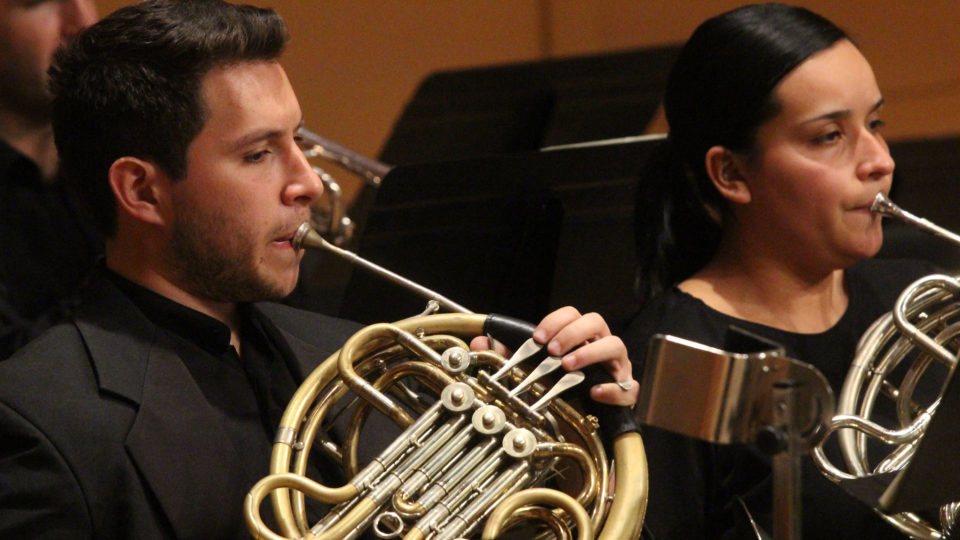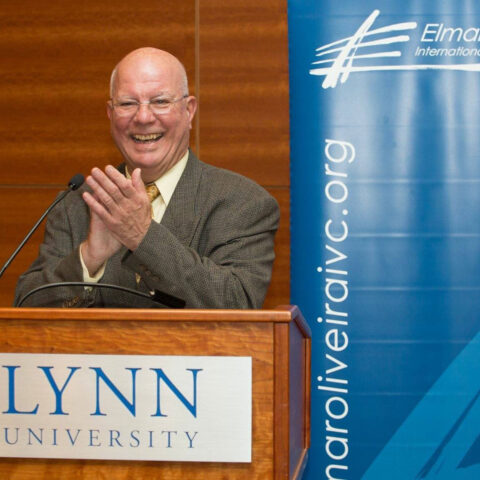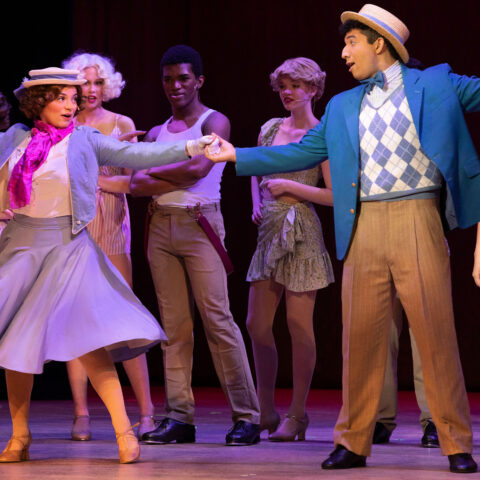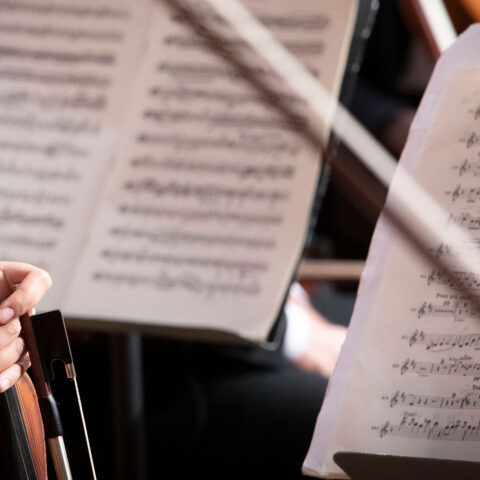Hugo Valverde ’16 has landed one of the most coveted positions in classical music by winning the second French horn position for the MET Orchestra in New York City. He started as an official member of the orchestra in August.
“I was in shock,” Valverde said. “They said, ‘Are you ok?’ Then the judges all clapped for me. I will always remember their expressions.”
The judges were a little shocked, too, because Valverde, at 22, is exceptionally young for such an accomplished horn player. Unlike most orchestras, the MET holds blind auditions, so Valverde and the other hopefuls performed their opera excerpts behind a screen. The panel judged only his music, having no knowledge of his age, gender, background or even his name. He was anonymous No. 7 during his audition.
“They were really surprised I was so young,” he said. “It was funny.”
Opportunities to join a prestigious orchestra like the Metropolitan Opera’s are rare. Valverde replaces a second horn player who was retiring after 28 years. With more than 200 performances each season in the Metropolitan Opera House, Carnegie Hall and Lincoln Center, the MET Orchestra offers career stability uncommon for musicians.
“The MET is a once-in-a-lifetime opportunity,” Valverde said. “I am really fortunate and thankful to my teachers and my family that they helped me accomplish my dreams.”
Gregory Miller, distinguished artist in residence in French horn at Lynn’s Conservatory of Music, said he was elated to learn his protégé had earned a spot at the MET.
“I didn’t have any doubt that Hugo would do well,” Miller said. “He was always pursuing opportunities. When he was a student at Lynn, he auditioned for Chautauqua and got in two years in a row. He auditioned for the Pacific Music Festival in Japan and the Aspen Music Festival, and got into both of them. Everything he did was always striving for the top.”
Raised in Costa Rica, Valverde took his first music lesson at age 7. When he was 13, he was accepted into the National Music Institute of Costa Rica. While still in high school, he performed with the Costa Rican National Symphony Orchestra. Miller had been invited to play a concerto with the orchestra and teach a master class. Valverde asked him for a private lesson.
“He told me he had a half hour only,” Valverde said. “It ended up being a two-hour lesson.”
Miller saw how earnestly Valverde wanted to improve, how genuinely interested he was in being a professional musician.
“I told him he needed to come to the U.S. to study,” Miller said.
It was already April of Valverde’s senior year. He had no visa, and had not taken the language exam, TOEFL. Costa Rica had none scheduled. So, after cramming for several weeks to tighten his English skills, Valverde boarded a bus by himself for a 12-hour trip to Panama to sit for the English proficiency test. He passed. Two weeks before the beginning of Lynn’s fall semester, the consulate in Costa Rica came through with his visa and Valverde bought a plane ticket.
“I finally made it,” he said. “I liked Lynn immediately, but the language was really hard for me. I struggled with all of my classes, except music. I just wanted to play the horn, but Greg Miller told me I had to learn to balance the two and get as serious about academics as I was about music.”
Miller asked his professors to keep him apprised of Valverde’s classroom performance.
“I was the first one there to ream him out about missing a class or doing poorly on a test,” Miller said. “I told him he could not be so incredibly successful in one area of his life and be abysmal in the other. I joked about it, but I knew his parents expected him to do well.”
Valverde took Miller’s admonitions seriously and by the time he graduated, was already looking into master’s degree programs. Not surprisingly, he went all in, auditioning for the premier French horn program in the country at the Shepherd School of Music at Rice University in Houston.
“I told Hugo that Rice only takes the top students. They’ll have upwards of 100 kids audition for maybe three openings in the graduate program,” Miller said. “But Hugo said he was ready. It’s hard to stop him when he decides he wants something.”
After a year at Rice, with his visa status coming to an end, Valverde decided the time had come to play professionally. He had auditioned for a handful of openings with orchestras in the States, with good results and one offer, but he had to decline it because the salary would barely cover the costs of extending his visa.
“I only had a certain amount of money I could afford to spend flying to auditions, staying in hotels, paying for meals. It’s tough when you don’t have an income yet. I couldn’t take all 10 auditions that were possibilities. So I thought to myself: Am I ready for the MET, for the top orchestra in the country?”
The answer was yes.
The MET was unlike any other audition because the repertoire is opera, not typically played by orchestras or symphonies, and rarely taught in conservatories. Valverde knew none of the pieces. Three months of intense practice followed.
The MET had narrowed the applicants to a pool of 60 musicians for the first round. Twelve of the 15 judges voted Valverde through to the semifinals. The second day, he was one of seven. Then, it was down to him and one other candidate.
“The other guy went first,” Valverde said. “All you can do is wait, try to stay calm and focused.”
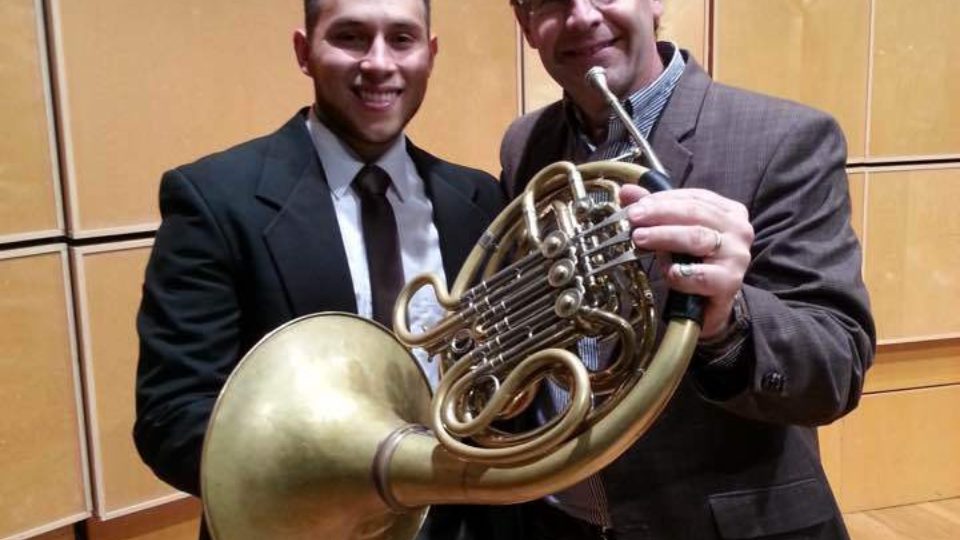
For the finals, Valverde played excerpts from Tosca, Don Carlos and three other pieces, 20 minutes in all. He waited alone for the results.
“And I won. All the judges were really happy for me when they told me,” Valverde said. “I met everyone and then the horn section took me to a restaurant near Lincoln Center for dinner and a celebratory beer. Then I flew home to Costa Rica to be with my family, to clear my mind and think about the whole experience.”
When the MET season opens this fall, Valverde will be in the horn section with a little piece of Lynn. He had come to the conservatory in 2012 without a horn of his own. Valverde fell in love with a loaner from Miller, so his parents began making monthly payments to buy it for him. Valverde will be playing that horn at the MET.
